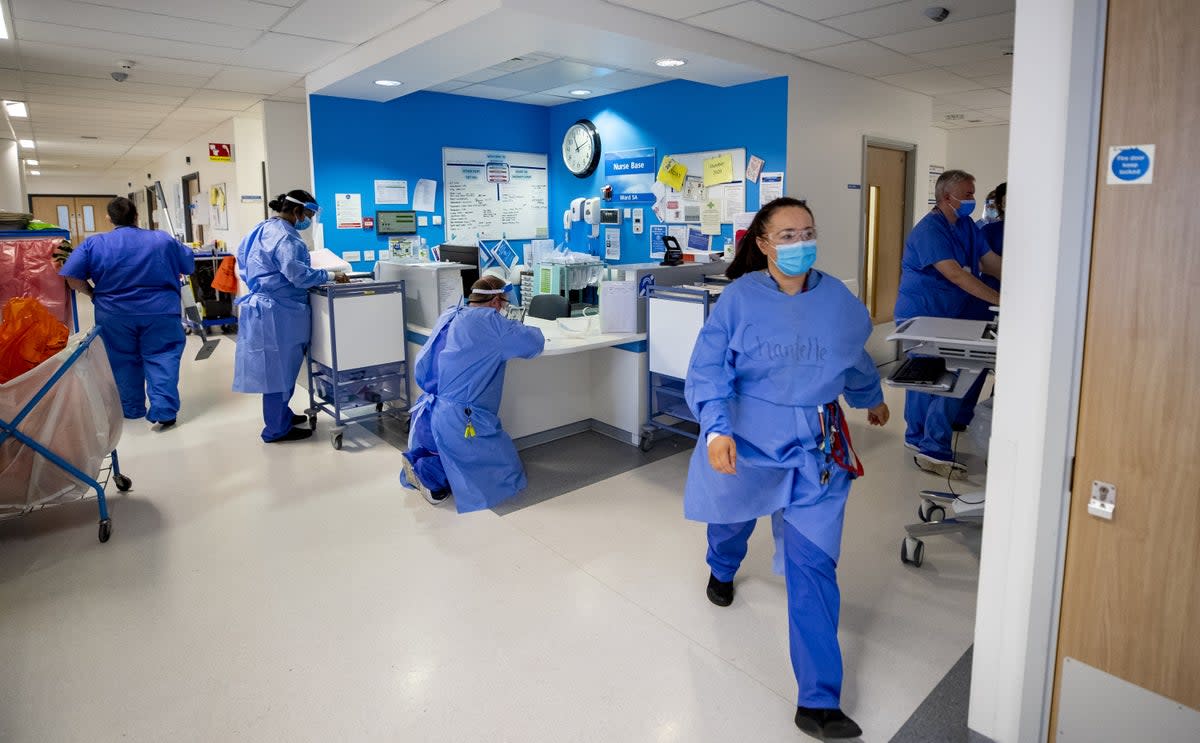Covid cases jump 18% in a week as hospitalisations rise

The number of Covid cases has jumped by 18 per cent in a single week to reach the highest level since mid-August, according to new figures.
Around 1.3 million people in private households across the UK are likely to have tested positive for the virus in the week to September 26, according to the Office for National Statistics (ONS).
This is up from 1.1 million in the previous week and marks the highest total since the seven days up to August 16, at the peak of the wave caused by the Omicron BA.4/BA.5 subvariants of the virus.
Sarah Crofts, ONS deputy director of the Covid-19 infection survey, said infections were rising in England but the picture was “uncertain” in the rest of the UK.
“Amongst the over-70s there has been a marked increase in infections in England this week, a trend which we will closely monitor as the winter months progress,” she added.
In England, the number of people testing positive for Covid in the latest survey was 1.1 million, or around one in 50 – up from 857,400, or one in 65, in the previous week.
Prof Mark Woolhouse, Professor of Infectious Disease Epidemiology, University of Edinburgh, said of the figures: “These figures are not yet alarming but they are concerning. This is the third year in a row that we have seen a rise in cases during the autumn.
“There is a tendency to attribute this to the start of the school year, but schools have never been the main drivers of the epidemic and school-aged children currently have neither the highest nor fastest rising prevalence of infection. More likely, the driver is the end of the summer and a general return to more indoor activities across all age groups, coupled with a waning of vaccine immunity.”
Elsewhere, separate figures from NHS England showed the number of beds occupied by Covid-19 patients in London’s hospitals has risen to its highest figure in six weeks.
A total of 1,228 beds were occupied by people with Covid-19 as of October 5 – a rise of 23 per cent in a week.
Kings College Hospital had the highest number of patients testing positive for the virus in London, with 198 beds occupied in total as of October 5. This was followed by the Royal Free London NHS Trust with 139 patients and then Barts Health NHS Trust with 118.
Across England, a total of 9,631 people with Covid-19 were in hospital – a jump of 37 per cent on the week before.
However, the figures remain far below those reached during previous waves of the pandemic. The highest number of beds occupied by Covid-19 patients in the capital so far this year was 4,047, recorded on January 5 at the peak of the omicron wave.
It follows a rise in infections in the capital, with a total of 875 cases recorded on October 3 - the highest number in two months. A third of eligible Londoners aged 12 and above (65.1 per cent) had still not received their second Covid-19 vaccine dose as of October 5.
Dr Susan Hopkins, chief medical adviser at the UK Health Security Agency (UKHSA), said the latest increases were “concerning”, and that cases and hospitalisation rates were at their “highest level in months”.
“Make sure you have any Covid-19 vaccinations you are eligible for and avoid contact with others if you feel unwell or have symptoms of a respiratory infection,” she added.
In a further development on Friday, the UK Health Security Agency (UKHSA) said a number of new Covid-19 variants are circulating in the country.
All of them are currently at a low level, but some are believed to have a degree of immune escape, meaning a person's immune system can no longer recognise or fight this type of coronavirus.
Three of the variants show evidence of a "growth advantage" compared to Omicron BA.5, which is currently the dominant variant in the UK.
These are all types of Omicron and have been named BA.2.75.X, BF.7 and BQ.X.
It is possible that the new variants are fuelling the current rise in infections, but "it is likely that other factors are contributing", the UKHSA added.

 Yahoo Movies
Yahoo Movies 
